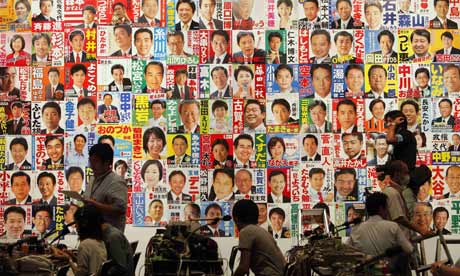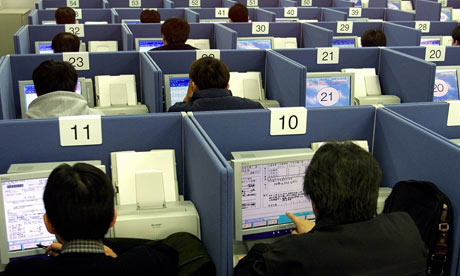DPJ ends 54 years of almost unbroken conservative rule in Japan
• Hatoyama's DPJ expected to win 300 seats
• Cost of election pledges and US policy under fire
- guardian.co.uk, Sunday 30 August 2009 19.47 BST
- Article history

The media wait for the vote count to start in front of posters for the Democratic Party of Japan, which swept into power today. Photograph: Itsuo Inouye/AP
Japan's opposition carried off a stunning victory in today's general election, crushing the ruling party and raising hopes of a significant shift in policy after more than half a century of almost unbroken conservative rule.
Hours after the polls closed, the Democratic Party of Japan (DPJ) had surpassed the 241 seats it needed to win a majority in the 480-seat lower house and oust the Liberal Democratic party (LDP) from power.
Major television networks projected that the DPJ, a broadly progressive party whose ranks include socialists as well as former LDP rebels, would secure more than 300 seats, almost triple the number it held going into the election.
The incoming prime minister, Yukio Hatoyama, will lead Japan's first non-LDP administration since 1993, and only the country's second since 1955.
Speaking to jubilant party members in Tokyo, he said he remained committed to the mantra of change that had swept the DPJ into power. "The people are angry with politics and the ruling coalition," he said. "We keenly felt that people wanted a change in their lives, and so we fought this election for a change in government."
Taro Aso, the outgoing prime minister, indicated he would resign as head of the LDP to take responsibility for a disastrous night that could see the party's strength reduced from 300 seats to just over 100.
"These results are very severe," he said. "There is deep dissatisfaction with our party." In a potentially intriguing development, those emerging as possible candidates for the LDP presidency included Hatoyama's brother, Kunio, a former justice minister in the Aso administration.
With an overwhelming public mandate secured, Hatoyama will quickly come under pressure to make good on his manifesto pledges. He has promised to eliminate wasteful public works, challenge elite bureaucrats' policy stranglehold and invest heavily in social security in one of the world's most elderly societies.
But he has come under fire for failing to cost proposals such as free high school education and a 26,000 yen (£170) a month child allowance. Sceptics have also questioned his ability to wrest power from the mandarins who have dictated Japan's postwar economic policy.
There is potential, too, for friction with the Washington if Hatoyama pursues an election pledge to end Japan's "subservience" to American foreign policy, including plans to halt a refuelling mission in support of US-led forces in Afghanistan.
In a New York Times opinion piece, he said the failure of the Iraq war and the global financial crisis proved that "the era of US-led globalism is coming to an end."
He added, however, that the US would "remain the world's leading military and economic power for the next two to three decades" and he ruled out a radical shift in bilateral ties. The US-Japan alliance, he said, would "continue to be the cornerstone of Japanese diplomatic policy".
Analysts said the election result heralded a fundamental shift in Japan's conservative-dominated political culture.
"This is about the end of the postwar political system in Japan," said Gerald Curtis, an expert on Japan at Columbia University in the US. "It is the only time any party other than the LDP has won a majority in the lower house of the Diet. It marks the end of one long era, and the beginning of another one about which there is a lot of uncertainty."
Much uncertainty centres on the DPJ's spending commitments as Japan, already saddled with a huge public debt, emerges from its deepest recession since the war.
Richard Jerram, the chief economist at Macquarie Securities in Tokyo, described Hatoyama's 16.8tn yen investment programme, as a "quasi-socialist approach" that would harm Japan's public finances and blunt its competitiveness.
"The core of the DPJ's economic policy seems to be a fantasy Robin Hood scheme, aimed at appealing to as many voters as possible," he said.
Japanese newspaper editorials agreed that his first task must be to steer Japan towards sustained economic recovery.
"We want to ask the next administration to swiftly deal with concerns about unemployment uncertainty and deflation, which are deepening simultaneously," the Nikkei business paper said.
While Aso counted the cost of a year in office bedevilled by gaffes, sleaze and mounting economic woes, Hatoyama was reportedly discussing his cabinet.
The administration is expected to include two minor parties, giving the DPJ majorities in both houses of parliament.
Despite nagging concerns over the DPJ's ability to govern, its extraordinary rise to power appears to have stirred voters out of their disenchantment with politics.
Japan unemployment hits record high
Jobless rate at 5.7% and consumer price fall of 2.2% highlight fears of double dip
- guardian.co.uk, Friday 28 August 2009 11.33 BST
- Article history

Japanese job seekers look for work on computer screens. Photograph: Itsuo Inouye/AP
Unemployment in Japan rose to a record high and consumer prices dropped at an unprecedented pace last month, adding to fears that the country's economic recovery is already stalling under the grip of deflation.
Just two weeks after Japan emerged from its worst recession in half a century, its internal affairs ministry said that the jobless rate rose to 5.7% in July from 5.4% a month earlier. Core consumer prices fell 2.2% as concern mounted that the world's second biggest economy is caught in a deflationary spiral.
The figures will come as a blow to the prime minister, Taro Aso, whose Liberal Democratic Party (LDP) is expected to suffer a heavy defeat in Sunday's general election.
Household spending fell 2% last month in a further sign that the boost provided by one-off cash handouts as part of Aso's record ¥25tn (£163bn) stimulus programme was beginning to wear off.
"Japanese households are becoming increasingly defensive as the environment surrounding wages and employment turns severe," said Kyohei Morita, the chief economist at Barclays Capital in Tokyo.
Unemployment, at its highest level since records began in 1953, surpassed the previous record of 5.5% in April 2003 and was expected to rise as high as 6% next year.
Takeo Kawamura, the senior government spokesman, defended his party's record on handling the economic crisis. "There is no denying the fact that the economy is improving overall," Kawamura said.
Figures out last week showed that the economy grew at an annualised rate of 3.7% in the second quarter of this year – the first expansion for more than a year.
Analysts expect the LDP to be punished for failing to stem job losses as it braces itself for only its second period in opposition for more than 50 years.
The number of people out of work rose by more than 200,000 in July, the ministry said, bringing the jobless total to 3.59 million – more than a million up on last year.
"The rise to a record high in the jobless rate was expected but the worsening job and income situation highlights worries about the Japanese economy heading into a double dip as the government stimulus runs out," Yuichi Kodama, an analyst at Meiji Yasuda Life Insurance, told Reuters.
"The economy's recovery may slow down in July-September compared with April-June.
No comments:
Post a Comment